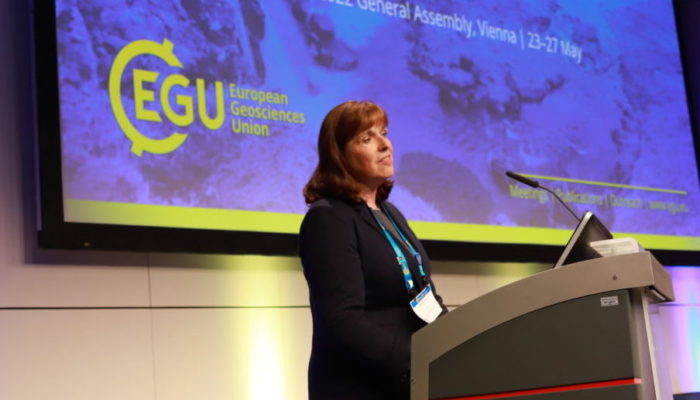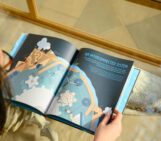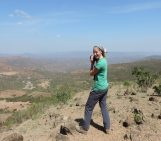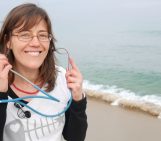
Hi Helen, thank you for agreeing to do this interview! Before we dive in deeper, could you please introduce yourself and your role for our readers?
I am a geologist by background having started my career with the British Geological Survey in the UK over 30 years ago. In that time, I have had several roles including as a coastal geologist, geoinformatics specialist, and most recently working on data science policy and practices.
It was my role as an informatics specialist that led to me receiving the EGU Ian McHarg Medal in 2016 for my contributions to advancing data sharing across different disciplines and organisational boundaries. The following year, I was elected as president of the EGU Earth and Space Science Informatics (ESSI) Division where I represented the informatics community in the EGU Council, and also joined the Outreach committee that raises awareness of EGU and its activities in the geoscience community and beyond.
In 2019 I was elected as the next President of EGU and took up this position in 2021, having served as Vice President during the previous year. As President, I lead the Union working in close consultation with members of both the Executive and the Council, as well as the EGU Office staff.
EGU turns 20! What does this milestone mean to you, both in your role and personally?
For EGU to have been the premier Earth, space and planetary science society in Europe for twenty years demonstrates the importance of the organisation for our members. In that time, both the membership and the number of people that attend our General Assembly have grown steadily, which is a strong signal that EGU continues to be relevant for geoscientists not just in Europe but globally.
During my two years as President of EGU, I hope that I can continue the efforts of previous incumbents to ensure that the organisation continues for another 20 years. EGU has faced some unprecedented challenges over the last two years, but it continues to evolve with new and exciting initiatives already planned for the future. The first of these being the recent launch of the pioneering EGUsphere preprint server that provides greater transparency throughout the peer review process.
The Union has come so far in the last two decades – in what ways have the goals and objectives of the organization changed over the years?
EGU has always been a bottom-up organisation with the members guiding its key priorities. For this reason, the objectives and goals of the Union have continued to reflect the focus areas for the Earth, space and planetary scientists that we serve and represent. Many of their priority areas are those that challenge society at large such as climate change and sustainable development. EGU has itself sought to take actions that address these issues, such as the increasing focus on ‘greening’ of the Union with initiatives to reduce the environmental impact of our events and activities. However, it is notable that in recent years, equality, diversity and inclusivity (EDI) in the Earth, space and planetary sciences has also become a high priority for our members, which has been reflected in updates to the EGU vision and strategy, and the creation of the EDI group that recently transitioned to a committee within the EGU governance structure.
To ensure EGU remains relevant for our members whilst also being as robust and resilient as possible, we have also just concluded an internal governance review that has undertaken an in-depth evaluation of our different processes and activities. The resulting recommendations, which are already being implemented, make sure that EGU continues to serve the needs of our members and can respond to any future challenges that may arise.
What are some of your favourite ‘firsts’ at EGU that you believe have positively influenced where we are today?
The first ever virtual and then hybrid General Assembly have been exciting developments for EGU. Although, these were both realised out of necessity due to the COVID-19 pandemic, EGU was already looking at ways to make our events more accessible and reduce the carbon footprint of our meetings as part of our wider efforts of EGU to ‘go green’. In fact, the pandemic has accelerated the implementation of our concepts for the General Assembly of the future that were already being formulated.
It is also worth mentioning that the advent of the hybrid format has been a major step forward in terms of the inclusivity and accessibility of EGU events. A review of the statistics for those participating in the virtual (2020) and hybrid (2021) General Assembly has shown greater diversity of attendees in terms of geography and career stage. Feedback from the post-event attendee survey also showed that many of those joining remotely had not previously had the opportunity to participate in the physical General Assembly in Vienna due to their personal or financial circumstances. The new hybrid format has opened the possibility of joining the GA for many more people who can now benefit from the online component.
The other ‘first’ of personal significance has been having both a female President and Vice President of the Union. This is another important milestone for EGU which had traditionally had a less gender diverse leadership team! I hope that Irina and myself are role models for the next generation of Earth, space and planetary scientists, and show that there are real opportunities for women to hold high-profile leadership positions. At a time when EGU is advocating for equal opportunities in the Earth, space and planetary sciences, it is timely that the Union should have women in key governance roles at all levels of the organisation.
Will the Union be doing anything differently during its third decade? If yes, how do you see this new direction impacting our members and our scientific community?
The advent of hybrid meetings will bring increased accessibility for a wider range of people. Being able to participate in EGU activities virtually will increase the diversity of those attending in terms of geography, career stage and personal circumstances. Hybrid meetings along with other initiatives will also bring a greater focus on the environmental impact of EGU activities. For example, a number of EGU Council and committee meetings will remain in a virtual format to reduce the need for travel, and we will continue to investigate other ways to reduce our carbon footprint in the future.
Personally, I find it heartening to see the many ways in which EGU supports Early Career Scientists (ECS). Has this always been an area of focus for the Union?
Early Career Scientists (ECS) make up a significant proportion of the EGU membership and recognition of their role in the organisation has grown throughout the 20 years that EGU has been in existence. This very active community supports many of the Union’s activities and EGU seeks to ensure early career scientists are represented throughout all levels of EGU governance from the Division level representatives to the ECS Representative to Council.
EGU also has several awards specifically for early career scientists including the Union level Arne Richter Awards for Outstanding Early Career Scientists. We also aim to support ECS participation in EGU activities, including participation in the annual General Assembly through the Roland Schlich travel grant scheme.
Looking back now, what are some of your memorable EGU moments?
One memory that will stay with me will be the determination of the volunteers that made up the Programme Committee, the EGU Office staff and Copernicus (our conference partner) to deliver the virtual EGU20 when the COVID-19 pandemic made the physical meeting in Vienna impossible.
The monumental effort by everyone involved to realise the virtual General Assembly in just over six weeks was incredible. Their dedication and commitment allowed attendees participating online to share their research and connect with colleagues despite the unprecedented situation caused by COVID-19. Many attendees were experiencing severe disruptions in their research due to isolation from colleagues, fieldwork being cancelled and inaccessible research facilities. Being able to participate in EGU20 gave many the opportunity to connect with others in their community despite the challenges of the global pandemic.
Another memorable moment for me personally that deserves a mention is having the honour of presenting the EGU awards and medals to those recipients who are being recognised for outstanding contributions in their respective fields of research. For many of those receiving this recognition from their peers, it is both career defining and self-affirming. It has been such an honour to be part of this highly significant moment for those receiving their awards and medals. As a previous EGU awardee I know what receiving an EGU award means to those receiving this recognition, and just how emotional it can be. I will not forget being part of the EGU Awards Ceremony!
Do you have any advice for people who want to engage with EGU in the near future?
There are many ways that someone can get involved with EGU whether it is by joining one of our committees or taking an active role at the Division level. My personal experience has been that the time you commit to supporting EGU will return greater rewards than any personal investments of effort you may make. EGU succeeds because of the dedication of its volunteers, and there are so many opportunities to share your expertise whilst also learning from others who come from other domains and disciplines, some of whom might be quite removed from your daily sphere of experience. EGU gives you the opportunity to work with like-minded people to drive forward the largest geoscience organisation in Europe for the benefit of its members and the entire Earth, space and planetary science community.
Finally, what are you most excited about or looking forward to at EGU next?
As the concept for EGU23 is beginning to develop, it’s exciting to see the next stage in the evolution of the fully hybrid model for the General Assembly. Without the previous restrictions due to COVID-19, it will be an opportunity to realise the GA of the future that takes the best aspects of previous meetings and blend them with new approaches and technologies to deliver an even better experience for everyone whether they are participating in person or online.




